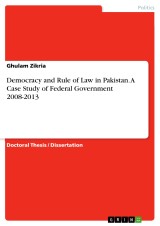Details

Democracy and Rule of Law in Pakistan. A Case Study of Federal Government 2008-2013
1. Auflage
|
CHF 38.00 |
|
| Verlag: | Grin Verlag |
| Format: | |
| Veröffentl.: | 09.09.2024 |
| ISBN/EAN: | 9783389066379 |
| Sprache: | englisch |
| Anzahl Seiten: | 251 |
Dieses eBook erhalten Sie ohne Kopierschutz.
Beschreibungen
Doctoral Thesis / Dissertation from the year 2019 in the subject Political Science, The Islamia University of Bahawalpur (Department of Political Science), language: English, abstract: The root meaning of democracy is the “power of the people” to govern the state directly or through their representatives, chosen via free and fair elections. These representatives reflect the will of the majority, but democracy also ensures the fundamental rights of minority groups. As the most popular system of government globally, democracy allows people to make decisions for themselves and the public good. Adherents of democracy and the rule of law argue that government must operate on predictable, general, and applicable rules established in advance to ensure equality, uphold laws and human rights, and deliver prompt justice. Thus, democracy and the rule of law are seen as inseparable and interdependent by political scholars, analysts, and politicians.
Since its founding in 1947, Pakistan’s political history has been marked by challenges with democracy and the rule of law. Military coups, authoritarian rule, bureaucratic interference, and political intolerance have prevented the establishment of stable political institutions. Civil and military dictators have curtailed freedoms by imposing military rule and excessive Presidential Ordinances, undermining the legislature. Judicial independence has often been compromised, with the judiciary used to extend dictatorial rule and legitimize arbitrary decisions under the pretext of “state necessity.” However, from 2008 to 2013, Pakistan saw a shift towards democratic principles. National integrity was strengthened through coalition-based government, and political tolerance was promoted by both the ruling party and the opposition. The parliament passed several laws, addressing issues such as abolishing the concurrent list and revising the resource allocation formula, which improved the rule of law. The military did not directly interfere, allowing the parliament to complete its term.
This shift in democracy and rule of law is analyzed using a qualitative approach, drawing on both primary and secondary sources. Primary sources include official reports, judicial verdicts, semi-structured interviews with prominent figures, parliamentary debates, and legal and historical documents. Secondary sources comprise newspaper articles, research journals, magazines, and various books. This study aims to provide a comprehensive understanding of the interplay between democracy and the rule of law in Pakistan, highlighting key challenges and developments.
Since its founding in 1947, Pakistan’s political history has been marked by challenges with democracy and the rule of law. Military coups, authoritarian rule, bureaucratic interference, and political intolerance have prevented the establishment of stable political institutions. Civil and military dictators have curtailed freedoms by imposing military rule and excessive Presidential Ordinances, undermining the legislature. Judicial independence has often been compromised, with the judiciary used to extend dictatorial rule and legitimize arbitrary decisions under the pretext of “state necessity.” However, from 2008 to 2013, Pakistan saw a shift towards democratic principles. National integrity was strengthened through coalition-based government, and political tolerance was promoted by both the ruling party and the opposition. The parliament passed several laws, addressing issues such as abolishing the concurrent list and revising the resource allocation formula, which improved the rule of law. The military did not directly interfere, allowing the parliament to complete its term.
This shift in democracy and rule of law is analyzed using a qualitative approach, drawing on both primary and secondary sources. Primary sources include official reports, judicial verdicts, semi-structured interviews with prominent figures, parliamentary debates, and legal and historical documents. Secondary sources comprise newspaper articles, research journals, magazines, and various books. This study aims to provide a comprehensive understanding of the interplay between democracy and the rule of law in Pakistan, highlighting key challenges and developments.

















